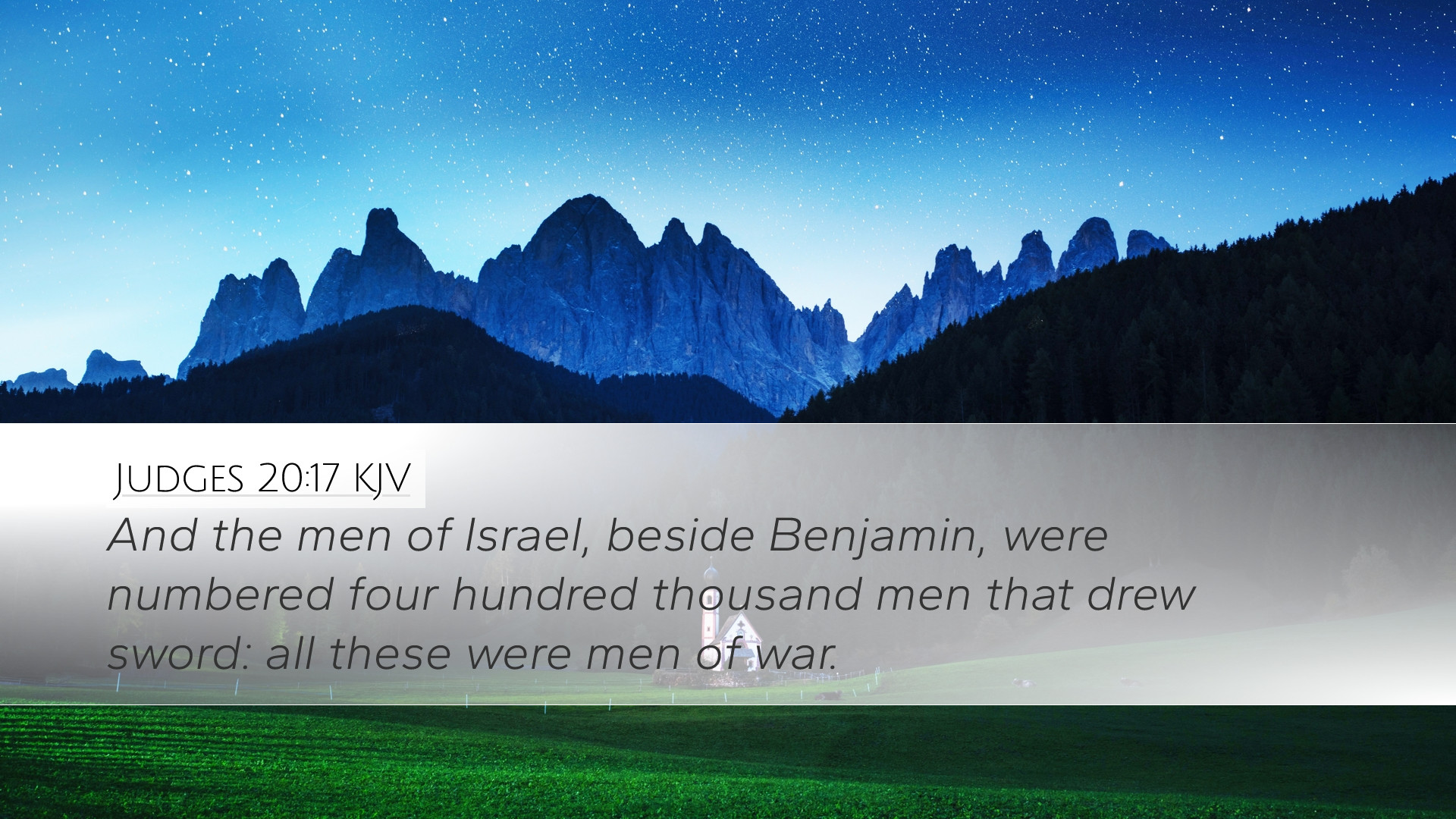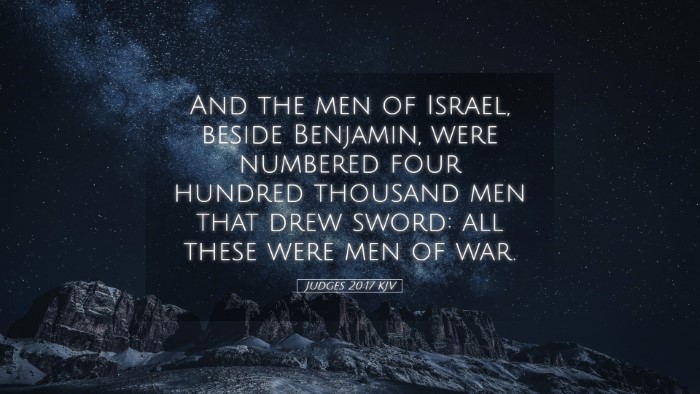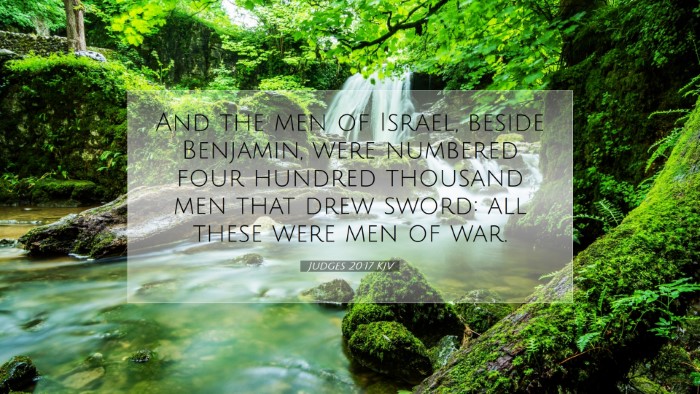Commentary on Judges 20:17
Judges 20:17 states: "And the men of Israel, beside Benjamin, were numbered four hundred thousand men that drew sword: all these were men of war." This verse serves as a significant pivot in the narrative of Judges, highlighting the gravity of the civil conflict and the pivotal moment in Israel's judicial history.
Contextual Background
The Book of Judges records a tumultuous period in Israel's history, marked by cycles of apostasy, oppression, and deliverance. Following the death of Joshua, Israel lacked a central governance, leading to tribal factions. Judges 20 addresses a dire situation where Israel rallies against the tribe of Benjamin due to a grievous sin committed within it, necessitating a united response.
Insights from Public Domain Commentaries
Matthew Henry's Commentary
Matthew Henry highlights the importance of this assembly of the warriors of Israel, noting that the number of armed men signifies the seriousness of the emerging conflict. Henry focuses on the unity and purpose of the men of Israel, emphasizing that united they stand against their brethren in Benjamin, which highlights not merely an external conflict but reflects deep moral and societal divides within Israel itself.
Henry argues that the gathering of 400,000 men illustrates the stark contrast between Israel's commitment to justice and the heinous act that provoked this mobilization. He notes, “This was a surprising display of zeal for the Lord’s honor and the justice of His people.” The narrative, he asserts, is not just a historical recount but serves as a warning against internal strife and the consequences of sin that may spiral out of control.
Albert Barnes' Notes
In his commentary, Albert Barnes expounds on the numerical details presented in the verse. He speculates on the significance of "400,000 men of war," interpreting that this represents a full muster of capable warriors from the tribes of Israel who collectively affirmed their commitment to righteousness and justice. This mustering reflects the gravity of the sin committed by the tribe of Benjamin and showcases Israel's resolve to confront immorality within the nation.
Barnes emphasizes the seriousness of the situation, stating that the call to arms signaled the depth of discontent and moral outrage amongst the Israelites. He underscores that this mass mobilization demonstrated unity against an egregious act, exemplifying the call to uphold divine standards. This was a moment where the nation rallied together, transcending tribal divisions, to restore righteousness.
Adam Clarke's Commentary
Adam Clarke provides a historical perspective, noting that the mention of “men of war” indicates the militaristic preparedness and the vigor of the Israelites at that time. Clarke draws attention to the fact that while the gathering was for justice, it also pointed towards the deteriorating moral compass of Israel, where they felt compelled to resort to such means.
Clarke elaborates on the societal implications of this civil war, indicating that such internal strife was indicative of Israel's departure from God’s commandments. He posits that the number, “400,000,” while significant, also reflected a tragic moment in the history of Israel where brother fought against brother, raising questions concerning the nature of justice and societal cohesion.
Theological Implications
The multitude of men prepared for war in Judges 20:17 raises profound theological questions regarding community, justice, and the repercussions of sin within a society. The mobilization of forces signals a desperate need to confront sin, but this confrontation itself emphasizes the communal responsibility every believer bears toward one another.
-
Unity vs. Division: The assembly of a vast army speaks volumes about unity, yet reveals their inability to navigate moral confines without resorting to violence, pointing to the duality of human nature.
-
Justice and Retribution: The call to arms illustrates a collective desire for justice but raises questions about the means by which justice is pursued—does the end justify the means in the pursuit of moral rectitude?
-
The Role of Sin: This narrative underlines the pervasive impact of sin in a community; it serves as a reminder of the destructive potential of inner corruption that can divide and cripple a nation.
-
Divine Judgment: The gathering of Israel could indicate an impending divine retribution, one that serves both as a mechanism of justice and a lamentable consequence of moral failure.
-
Harmonizing Warfare and Peace: While Israel's resolve to confront sin is commendable, the context raises concerns about the necessity and appropriateness of warfare amidst a nation called to be a light to the world.
-
Calls for Reflection: For today's readers and leaders, this passage beckons reflections on how we confront sin within communities, urging a balance between zeal for justice and the way it is enacted.
Conclusion
Judges 20:17 provides a rich tapestry for reflection, illustrating a moment of collective resolve among the tribes of Israel towards confronting sin and injustice. Through the insights of esteemed commentators like Matthew Henry, Albert Barnes, and Adam Clarke, one gains a multifaceted understanding of the societal and theological dimensions involved in this complex narrative.
As pastors, students, theologians, and scholars engage with this text, the myriad themes of unity, justice, and the weight of sin within community must be examined, prompting not only historical inquiry but also contemporary application. The call for vigilance against moral decline, the commitment to divine justice, and the reflections on the means of enacting that justice remain critically relevant for today’s church and society.


